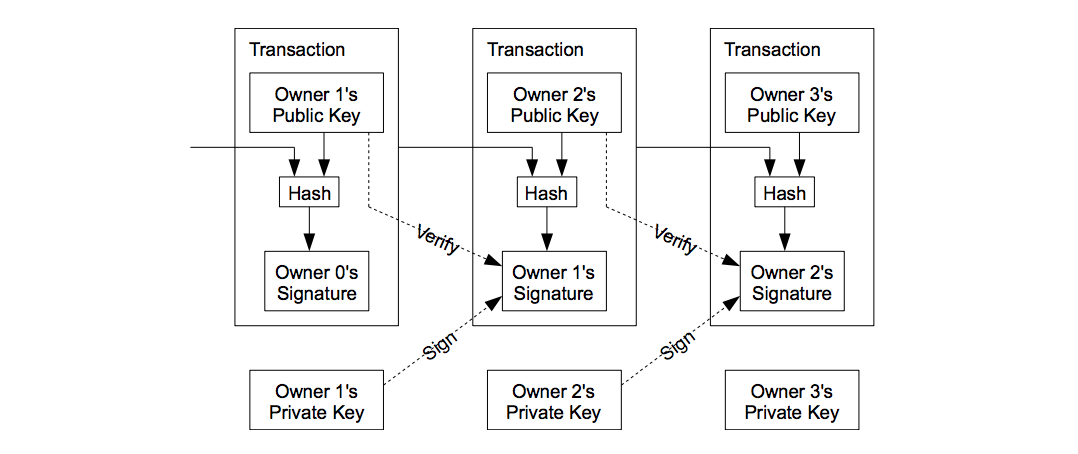In 2008 a paper was mysteriously uploaded to the public internet. Its author, writing under the pseudonym Satoshi Nakamoto, claimed to have finally achieved the holy grail of politically minded cryptographers: a decentralised digital currency. He did this by joining the dots between existing results in number theory and computer science. Nakamoto named his invention "Bitcoin".
Here are the dots he joined:
Digital Signatures
Digital Signatures predate Bitcoin by decades, and rely on a mathematical trick known as "trapdoor functions". Trapdoor functions are what allow us to securely send messages over the internet, for example when sending money with the old fashioned banking systems that Bitcoin seeks to replace. A trapdoor function is way of generating mathematical equations that are infeasible to solve unless you know a secret "private key" that then makes these equations trivial.
Someone with a private key can generate digital signatures that anyone can then verify – because once a solution to one of these equations is presented, it's easy to check if it works. A working solution serves as proof that the person who presented it had access to the private key. Bitcoin uses digital signatures to make sure that only you can spend your digital money. Your private key forms your digital "wallet" and you use it to generate a signature whenever you want to send money to someone else – in much the same way that physical signatures are used to transfer money with chequebooks.
A Distributed Ledger
Digital signatures might help us prove that we really do intend to spend our money – but they don't prevent us spending more money than we actually have (the equivalent of signing cheques when your bank account is empty). To solve this problem you need a ledger – a big list recording how much money each person has in their account. Keeping track of this ledger has traditionally been the role of banks who record and check the account balances of all their customers. In order to avoid relying on a central authority for its function, Bitcoin needs to store a ledger in some other way.
The solution Bitcoin uses is to share the job of keeping track of how much money everyone has between several "miners". The miners each take turns to confirm a "block" of digitally signed transactions (making sure that each person sending money actually has that money to send). Each block's validity depends on the one that came before it: hence a "block chain".
 Proof Of Work
Proof Of Work
If the miners are to take turns confirming blocks, we also need some way to coordinate who gets to confirm the next one – without keeping a central database of who's turn it is. Proof of work is Bitcoin's solution to this problem.
All the miners who want the privilege of confirming the next block of transactions (and therefore deciding which transactions take place and which ones do not) compete in an international competition to brute force a tricky mathematical problem. As soon as a miner solves the problem, they can add a valid block to the chain, and the next problem is generated based on the contents of this new block. Once this has happened – its more profitable for all the other miners to give up on the last problem and start on the next one, and in doing so they acknowledge all the transactions confirmed by the last block.
As fantastical as all this talk of international math competitions and anonymous inventors sounds, the technical foundations for a decentralised digital currency have been laid. Meanwhile the last few years have seen an explosion of digital currencies and assets building on Bitcoin's original proof of concept.
This is the full unedited version of an article I'm writing for the University of Oxford student press. The word limit was pretty harsh, and the University offers subjects ranging from Archeology to Materials Science so my article had to be concise and understandable by a wide audience. That said, it should give a pretty clear indication of my writing style and interests - so expect more of the same from this account!
Hi by the way! I'm new to steemit, and slowly beginning to upload my first articles. Most of what I'm writing at the moment is summaries of blockchain related stuff that I want to understand better. If you like what I write, feel free to hit me up in the comments or on steemchat - I'm very friendly (I promise).
@originalworks
Downvoting a post can decrease pending rewards and make it less visible. Common reasons:
Submit
The @OriginalWorks bot has determined this post by @misdoma to be original material and upvoted it!
To call @OriginalWorks, simply reply to any post with @originalworks or !originalworks in your message!
Downvoting a post can decrease pending rewards and make it less visible. Common reasons:
Submit
Congratulations @misdoma! You received a personal award!
Click here to view your Board of Honor
Downvoting a post can decrease pending rewards and make it less visible. Common reasons:
Submit
Congratulations @misdoma! You received a personal award!
You can view your badges on your Steem Board and compare to others on the Steem Ranking
Vote for @Steemitboard as a witness to get one more award and increased upvotes!
Downvoting a post can decrease pending rewards and make it less visible. Common reasons:
Submit